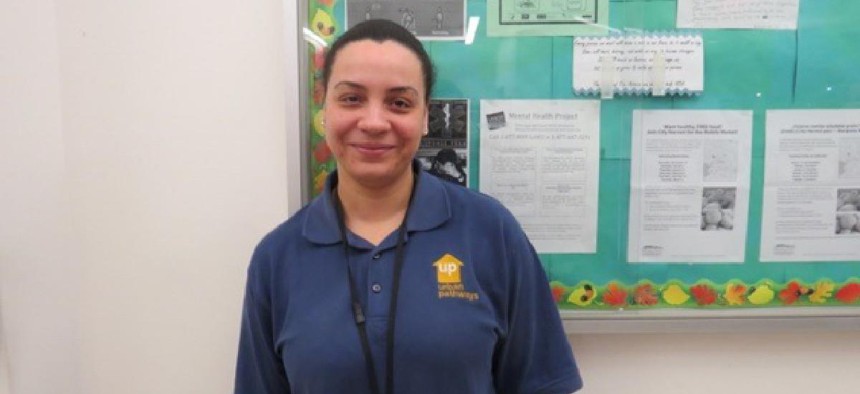Marisa Rodriguez, Security Staffer, Urban Pathways

For many of the residents at Urban Pathways’ Hallett’s Cove supportive housing complex in Astoria, Queens, their new apartment isn’t simply a roof over their head; it’s the first step toward rejoining society.
Many of Hallett’s Cove’s clients come directly from local homeless shelters or Creedmoor Psychiatric Center, where needs like medication and food were constantly monitored. Staff members aren’t simply providing safety and clean facilities; they are helping to form a nascent sense of community.
“It’s about really reintroducing them to the world,” said Rubernette Chavis, operations director at Hallett’s Cove. “It’s reacclimating them to how much a gallon of milk costs, using a MetroCard, washing clothes and walking to the store. Oftentimes, people will ask if it’s okay to go outside. We’re here to reacclimate them to being in the community.”
Given these needs, Marisa Rodriguez views her job at Hallett’s Cove’s front desk as so much more than monitoring security and answering phones. In many cases, Rodriguez is the glue that holds clients’ support systems together.
“I know all of the clients here and everything that is going on in their lives,” said Rodriguez. “Oftentimes, clients will come and talk to me when they need help or they’re feeling vulnerable, and I give them advice just to make sure that they keep making progress. I know that they came from hard times, and I don’t want to see them fail. I want to see them be the independent (people) that I know they can be.”
Rodriguez says that much of her role is going beyond her baseline duties, such as performing security checks on each floor of the building every hour, or assisting clients with their medication after they get home from treatment programs. The real crux of her role, Rodriguez says, is instilling in clients the sense that they can turn their lives around.
“Most of our clients have been on the streets for a long time, and they’ll feel down and think that nobody cares, nobody hears them, nobody can provide for them,” Rodriguez said. “I try to keep them in that positive mindset that you can do it, you can keep going.”
Despite being the first and last person that clients see each day, serving as the first line of response in case of an emergency and forming unique and lasting bonds, Rodriguez makes much less than the forthcoming New York City $15 minimum wage.
“We work so hard just to live off of our paycheck,” Rodriguez said. “Sometimes we do have to live paycheck to paycheck. When I first came here, I was working seven days a week, sometimes three or four double shifts.”
Rodriguez says that lawmakers and advocates should continue to fight for higher wages for workers like her so that she can better support her two children, and so that she can continue to do the job she loves without having to worry about how she will make ends meet.
“Sometimes people will say, ‘I work so hard and this is all that I get,’” Rodriguez said. “And we’ll lose good people because they can’t make this work. But I love this job, and I love working with the clients here.”